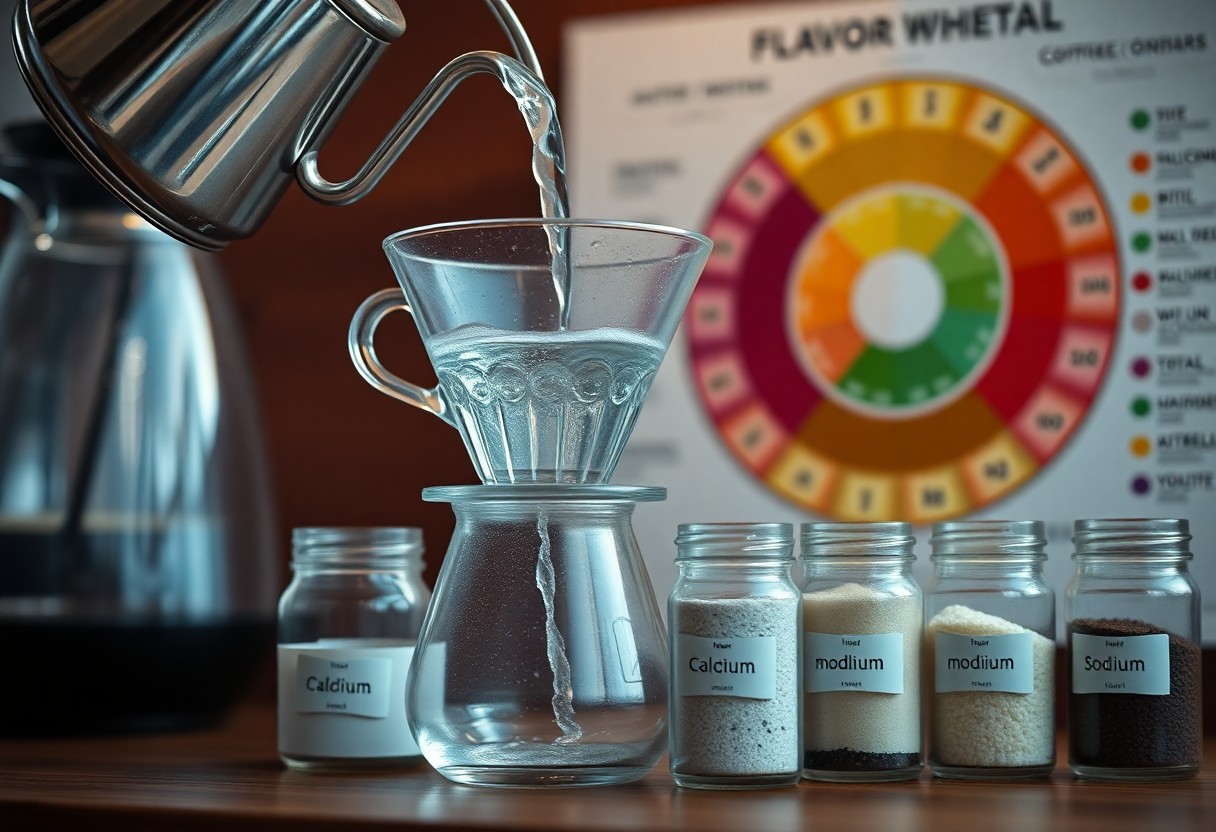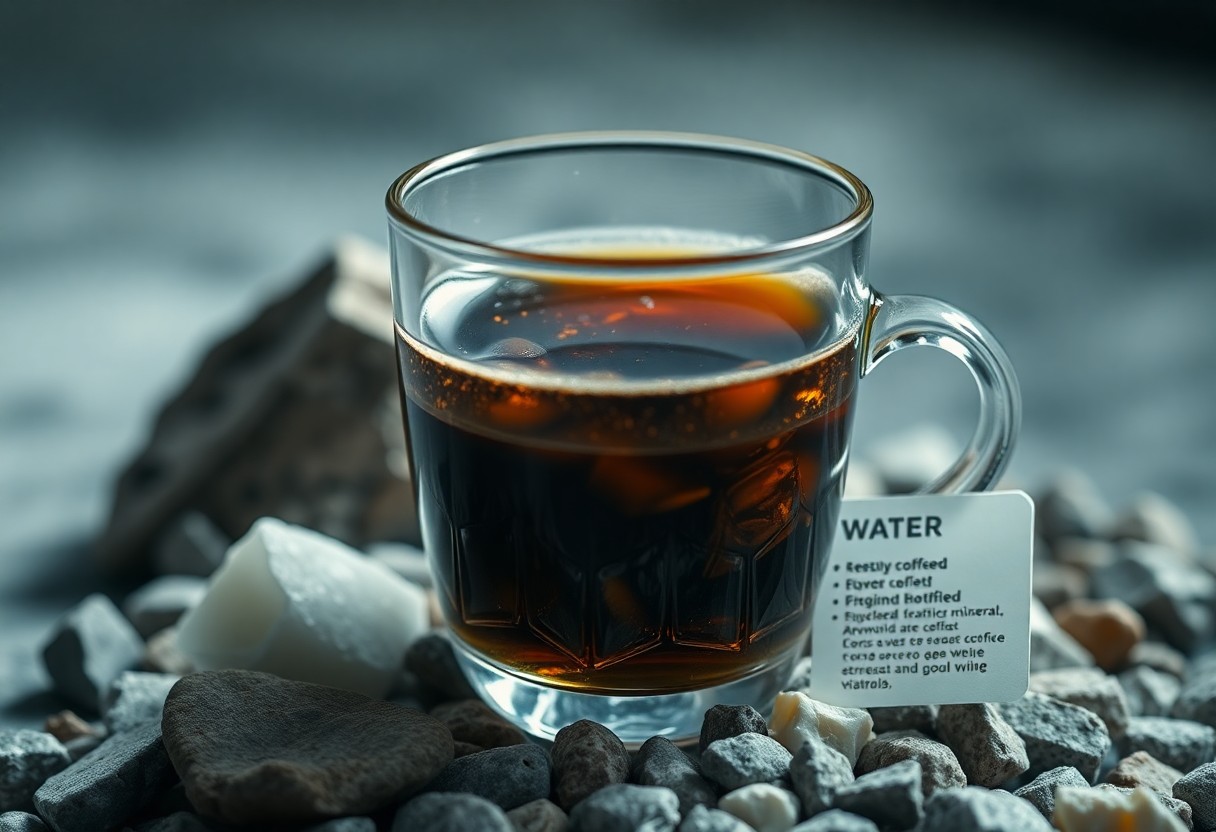With a deeper understanding of how water minerals influence your daily cup of coffee, you can elevate your brewing experience significantly. The minerals present in your water can either enhance or diminish the rich flavors and aromas of your coffee, leading to a more satisfying taste. Hardness, pH levels, and specific ionic content play key roles in highlighting different flavor notes. By paying attention to the water you use, you have the power to unlock the potential of your coffee like never before.
Key Takeaways:
- Water quality significantly impacts coffee flavor, with minerals like calcium, magnesium, and sodium contributing to the overall taste profile.
- Different brewing methods can extract flavors differently, emphasizing the importance of water mineral content in achieving the desired coffee taste.
- Balancing the mineral content in water can enhance coffee extraction, leading to more vibrant and complex flavor notes in the finished brew.
The Unsung Heroes: Essential Water Minerals
Understanding the role of water minerals in your coffee unlocks a deeper appreciation for its flavors and aromas. While many focus on the coffee beans themselves, minerals like calcium and magnesium play an integral part in how your brew turns out. These elements not only influence taste but also enhance the brewing process, ultimately leading to a more refined coffee experience.
Calcium and Its Creamy Contributions
Calcium offers a creamy mouthfeel to your coffee, mellowing the acidity and providing a smoother taste. This mineral increases the solubility of coffee compounds, effectively balancing the overall flavor profile. With the right calcium levels, your cup can present rich, velvety textures that make every sip enjoyable.
Magnesium: Enhancer of Aroma Complexity
Magnesium significantly uplifts the aromatic qualities of your coffee, creating a vibrant, complex flavor profile. It amplifies the extraction of aromatic compounds during brewing, resulting in a more fragrant cup. A well-balanced level of magnesium contributes to sweet notes, hinting at chocolate or caramel, and elevates your sensory experience with layers of depth.
Magnesium’s role extends beyond mere enhancement; it helps facilitate the extraction process of over 100 different aromatic compounds found in coffee. Research indicates that beans brewed with higher magnesium concentrations can deliver flavors ranging from floral to fruity, showcasing a world of aroma complexity that might go unnoticed otherwise. If you’ve ever savored a cup bursting with unexpected layers, magnesium was likely contributing to that delightful experience.
The Mineral Ratio Dilemma: Hard vs. Soft Water
The debate between hard and soft water continues to influence coffee enthusiasts. While hard water is rich in minerals that can enhance flavor complexity, it also contains higher concentrations of calcium and magnesium, which can lead to scale buildup in machines. On the other hand, soft water lacks these minerals and can result in a less desirable cup. Understanding the right balance of minerals in your brewing water can ultimately determine the depth and richness of your coffee’s flavor profile.
The Impact of Hard Water on Coffee Extraction
Hard water’s mineral content can dramatically affect coffee extraction, enhancing flavor compounds such as oils and acids. The presence of calcium and magnesium not only aids in solubility but also promotes a fuller body and richer taste. As these minerals interact with coffee solubles, they create a more vibrant brew. However, excessive hardness can produce an over-extraction, resulting in bitter and astringent flavors that overpower the desired notes.
Why Soft Water Can Lead to Flat Tasting Brews
Soft water typically lacks important minerals, which can lead to under-extraction of coffee grounds. Without adequate levels of calcium and magnesium, your brew may taste flat, lacking the intricate flavors and aromas that make coffee enjoyable. Many coffee lovers report that brews made with soft water often miss depth and complexity, resulting in a dull cup. This absence of minerals hampers the coffee’s ability to fully express its natural taste, leading to an overall lackluster experience.
In many cases, you might find that using exclusively soft water suppresses the flavors that are brought out by specific minerals. For instance, soft water fails to provide the necessary structure for the delicate coffee oils, which can mean your favorite single-origin brew loses its bright acidity and fruity notes. The goal is to strike a balance by utilizing a water profile that supports extraction while preserving the nuanced characteristics of your coffee, ensuring every sip is flavorful and satisfying.

Flavor Profiles: How Mineral Content Shapes Your Cup
The composition of water used in brewing directly influences the flavor profile of your coffee. Each mineral contributes unique characteristics, and understanding these interactions can dramatically enhance your coffee experience. For instance, the balance of calcium, magnesium, sulfate, and chloride not only affects the extraction process but also highlights specific notes, allowing you to savor the full spectrum of flavors from your beans.
The Influence of Chloride on Sweetness and Body
Chloride enhances the perception of sweetness and adds to the body of your coffee. With a higher chloride concentration, you may notice a richer, smoother mouthfeel that can help balance acidity. This creates a more rounded flavor profile, ideal for coffee lovers who enjoy a sweeter taste without overwhelming bitterness.
Sulfates and Their Role in Brightness and Clarity
Sulfates, commonly found in water, play a pivotal role in enhancing your coffee’s brightness and clarity. They create a lively, crisp sensation that accentuates the high notes of the coffee, such as floral or fruity flavors. A well-balanced sulfate content helps to elevate these attributes, allowing for a cleaner finish that makes every sip feel refreshing.
Specifically, sulfates contribute to the overall acidity, which can sharpen the perceived flavor intricacies of your brew. Higher sulfate levels can also enhance the brightness by sharpening the clarity of each flavor note. For example, if you’re brewing a light roast with citrus and berry characteristics, the right sulfate concentration will lift those tones, ensuring they shine through in every cup. Experimenting with water that has varying sulfate levels can offer significant insights into how these minerals shape not just your coffee, but your brewing preference as well.
Brewing Techniques That Maximize Mineral Benefits
Experimenting with various brewing techniques can significantly enhance the role of water minerals in your coffee, resulting in a richer and more complex flavor profile. Different brewing methods, such as pour-over, French press, or espresso, can extract distinct qualities from minerals, depending on factors like temperature and time. Fine-tuning your approach, such as adjusting grind size or water temperature, allows you to capitalize on the benefits of minerals in your water, leading to a more satisfying cup of coffee.
Adjusting Brew Methods for Optimal Extraction
Fine-tuning your brewing techniques is key to unlocking the full flavor potential of your coffee. For instance, adjusting your grind size can change the extraction rate of the minerals during brewing. A coarser grind may allow for slower extraction, while a finer grind increases surface area and can enhance flavor complexity. Tailoring your brewing time and temperature will also help you maximize the benefits from the minerals in your water, ensuring that your coffee maintains its desired taste characteristics.
Using Water Filtration Systems to Enhance Flavor
Implementing a high-quality water filtration system is one of the simplest ways to enhance the mineral content in your brewing water. These systems can remove impurities while retaining necessary minerals, thereby improving not just the taste of your coffee, but also its overall quality. Depending on the type of filtration system you select, you can customize the mineral ratios to suit your preferences, which can lead to a noticeable difference in flavor.
Investing in a reliable filtration system allows you to control what enters your water and, in turn, directly influences your coffee’s flavor. For example, reverse osmosis systems paired with remineralization filters can strike the right balance by removing unwanted chemicals and reintroducing beneficial minerals like calcium and magnesium. This setup can lead to a consistently better-tasting brew, as these minerals are known to enhance sweetness and balance acidity in your coffee. Moreover, many coffee aficionados report a smoother mouthfeel and more nuanced flavor profiles when using filtered water tailored specifically for their brewing methods.

The Coffee Connoisseur’s Guide to Water
Water quality directly impacts the way your coffee tastes. Fine-tuning the mineral content in your brewing water sets the foundation for extracting the optimal flavors from your favorite beans. As a coffee connoisseur, understanding the balance of minerals will allow you to bring out the most delightful notes and nuances hidden in each cup of coffee.
Testing Your Water: Understanding its Mineral Content
To grasp how your water affects coffee flavor, start by testing its mineral content. Use a water testing kit to analyze key elements such as calcium, magnesium, and sodium. Many local water utilities provide annual reports on water composition, making it even easier for you to know what’s running through your tap.
Customizing Water Profiles for Different Coffee Origins
Each coffee origin possesses unique characteristics, and customizing your water profile can enhance these qualities. For example, light roasts from Ethiopia often shine with *high acidity* and fruity notes that benefit from a water profile with lower mineral content. In contrast, *Brazilian coffees* tend to gain depth from water that has higher hardness, promoting a more rounded flavor.
Consider the specific flavor profiles associated with each coffee region to tailor your brewing water accordingly. For instance, coffees from Kenya often exhibit pronounced acidity, so using softer water may help attenuate any overpowering sourness while highlighting the coffee’s floral notes. Conversely, for rich and chocolatey Brazilian varieties, a water profile containing higher calcium and magnesium levels can add body and balance, enriching the overall mouthfeel. Your experimentation with these adjustments can significantly elevate your coffee experience, allowing the unique characteristics of each origin to genuinely emerge in your cup.
Final Words
Summing up, understanding the hidden role of water minerals in your coffee’s flavor can significantly enhance your brewing experience. By being mindful of the mineral content in your water, you can unlock the full potential of your beans, leading to a more balanced and enjoyable cup. Adjusting the mineral balance can help you achieve your desired flavor profile, allowing you to savor the complex notes each coffee has to offer. So, next time you brew, consider how your water might be affecting the taste and elevate your coffee game to new heights.
FAQ
Q: How do water minerals affect the flavor of coffee?
A: Water minerals play a significant role in shaping the flavor profile of coffee. They influence the extraction of coffee solubles, which are responsible for the taste and aroma. Different minerals such as calcium, magnesium, and sodium can enhance sweetness, balance acidity, and improve body, leading to a richer and more complex flavor.
Q: What are the key minerals to consider when brewing coffee?
A: The primary minerals that impact coffee flavor include calcium, magnesium, sodium, and bicarbonate. Calcium and magnesium help balance acidity and enhance extraction, while sodium can bring out sweetness. Bicarbonate acts as a buffer and can affect the perceived acidity of the brew.
Q: Can water hardness influence my coffee brewing experience?
A: Yes, water hardness, which is determined by the concentration of dissolved minerals, affects coffee extraction. Hard water, with higher levels of minerals, can lead to over-extraction, resulting in bitter flavors, while soft water may under-extract, yielding a weak and flat taste. Finding the right balance is important for brewing a pleasant cup.
Q: What is the ideal mineral content for brewing coffee?
A: The ideal range for mineral content can vary based on personal taste, but a general guideline suggests a total dissolved solids (TDS) level of 150-250 ppm (parts per million) with balanced proportions of calcium, magnesium, and bicarbonate. Testing and adjusting your water composition can help achieve the desired flavor.
Q: How can I modify my water to enhance coffee flavor?
A: To modify your water for better coffee flavor, you can use water filtration systems that adjust mineral content or add mineral supplements specifically designed for coffee brewing. Experimenting with different mineral levels can help you find the right balance that complements your coffee beans and personal taste preferences.
